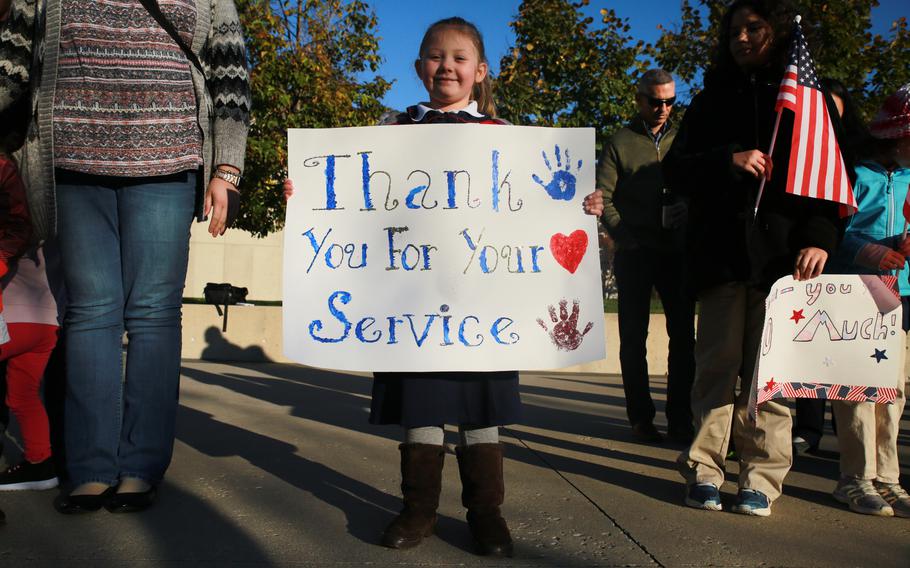
A girl holds a sign welcoming veterans of World War II and the Vietnam and Korean wars outside the National Museum of the Marine Corps in Triangle, Va., on Nov. 2, 2019. Many young veterans are uncomfortable with the phrase thank you for your service, a recent USAA survey found. Most veterans over age 45 said it didn't bother them. ( Kirstin Spanu/U.S. Marine Corps)
Younger American veterans and military personnel who receive a spoken thanks for their service are more apt to think “thanks but no thanks,” according to a new poll.
The finding came from a survey of 1,639 veterans and service members released Wednesday by financial services company USAA as part of a Veterans Day initiative.
About two-thirds of a mix of mostly veterans and some currently serving troops between the ages of 18 and 44 said the phrase “thank you for your service” makes them feel uncomfortable or awkward.
The survey found a generational divide on the phrase, which gained prominence after the start of the wars in Iraq and Afghanistan more than 20 years ago.
Most veterans over 45 said the phrase does not bother them. And 76% of veterans over 65 said the phrase does not make them feel awkward, with most responding that thanking them for their service is the most appropriate way to honor them.
In contrast, 69% of veterans and currently serving troops ages 18-29 said the phrase makes them uncomfortable, and 66% of respondents ages of 30-44 agreed.
The divide on “thank you for your service” comes from the difference in how various generations were viewed on returning home from war, said Kayla Williams, a former Army linguist who deployed to Iraq during the 2003 invasion, who now works at the Rand Corp. think tank as a researcher.
In her conversations with Vietnam War veterans, Williams often hears of a lack of public appreciation at the time, which is why they welcome the hearing the phrase now.
But the launch of an all-volunteer military force means that younger veterans view their service differently than those who were drafted, she said.
“All of us chose to join the military,” Williams said. “Many chose to do so in a post-9/11 environment where we knew we were going to deploy, so it’s awkward being thanked for doing the job you signed up to do.”
Veterans of the wars in Iraq, Afghanistan and Syria often have complicated feelings about their service that can’t be distilled into a short response when someone thanks them out of nowhere at the grocery store or on the bus, said Malia Du Mont, who served in Afghanistan and now is an officer in the Army Reserve.
These veterans deployed during wars that affected them deeply but that the American public largely ignored, Du Mont said.
“’Thank you for your service,’ for a lot of people feels like an empty phrase,” she said. “For younger veterans, I think, there’s an unspoken disappointment that when people say ‘thank you for your service,’ there’s that lack of understanding.”
USAA also surveyed more than 800 civilians and found that slightly more than half said they’d be surprised to learn that “thank you for your service” could make some veterans and service members uncomfortable.
The awkwardness is an “imperfect starting place” that could prompt conversations with civilians leading to more mutual understanding, said Phil Klay, a Marine veteran who deployed to Iraq in 2007 and won a National Book Award for his short stories on war and coming home.
“I’ve always felt like the phrase itself is a good thing,” Klay said. “Now, does it mean that it’s always offered sincerely? Does it mean the veteran might not have much more complicated feelings about their service? Does it mean that the phrase is sufficient? No.”